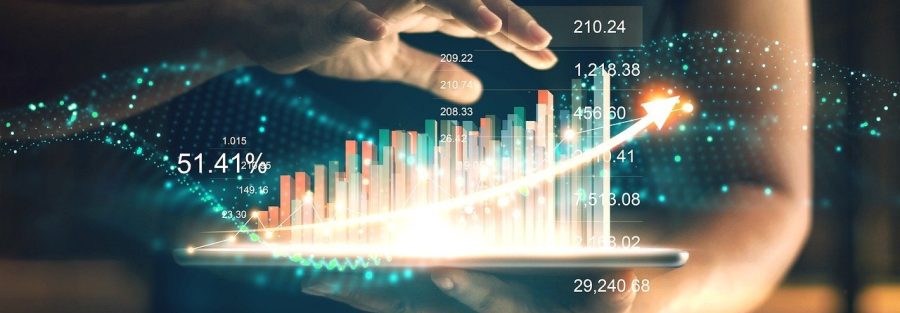Key takeways
- Efficiency and productivity are two important benefits organizations derive from using AI. AI enables organizations to handle tasks with volumes and speeds humans can't match.
- AI technology enhances predictive analytics by enabling businesses to analyze data faster, more accurately, and at scale than ever before.
- AI analyzes and learns from data to create highly personalized experiences and services.
- Data quality is vital for accurate data analysis. AI-powered data quality management solutions help companies improve data quality and ensure their data is objective.
- AI enables shorter cycles and reduces the time it takes to get from one stage to the next, such as from idea to market.
Artificial Intelligence (AI) is evolving in the business world. According to Forbes, AI-powered software is expected to have a market value of $125 billion by 2025, and companies are already using or planning to implement AI solutions in their operations. (Source: Forbes). With the help of AI-powered analytics software, businesses can now unlock valuable insights that were previously undiscoverable. This technology has revolutionized data analytics and presents businesses with opportunities for growth and development that they never thought possible before. Read on further to know how this technology can assist your business in growth.
Enhance Efficiency and Productivity
Efficiency and productivity are two important benefits organizations derive from using AI. AI enables organizations to handle tasks with volumes and speeds humans can’t match. Whether they’re using AI to research or analyze data to get information, generate code software, or implement specific business processes.
AI operates at a scale beyond human capabilities and eliminates time-consuming manual tasks for workers. It is a productivity measure that allows workers to perform higher-level tasks that only humans can perform. AI creates test data for verifying code and freeing developers to focus on more engaging work. It allows organizations to minimize the costs of performing routine and repeatable tasks. It can be accomplished with technology while maximizing the talent of their human resources.
Facilitates Predictive analytics
It is a data analysis technique using machine learning algorithms. It is to analyze historical data and recognize patterns to predict future outcomes. AI technology enhances predictive analytics by enabling businesses to analyze data faster, more accurately, and at scale than ever before.
Predictive analytics has various applications in many industries, such as healthcare, finance, retail, and manufacturing.
For example, healthcare providers can use predictive analytics to identify high-risk patients likely to be hospitalized again after discharge. It can help healthcare providers intervene early and prevent readmissions, leading to better health outcomes and cost savings. Banks use predictive analytics to identify fraud, predict customer churn, and identify potential new customers in the financial industry. By anticipating customer churn, banks can take preventive action to retain customers by offering promotions or improving their services. It can lead to customer churn, increase customer satisfaction, and ultimately revenue.
Helps Provide Personalized Customer Service and Experience
AI analyzes and learns from data to create highly personalized experiences and services. The clearest examples from the consumer world are streaming services like Netflix, and retailers use smart systems to study shopping habits. Individual consumer data and larger datasets determine what customers like at any given time based on their style, preferences, and needs. However, AI offers this personalization in many other areas, such as healthcare, where it personalized treatments and the work environment to meet the patient’s needs.
Facilitates Data Quality Management
It is another area where AI is revolutionizing data analytics. Data quality is vital for accurate data analysis. AI-powered data quality management solutions help companies improve data quality and ensure their data is objective. For example, AI-powered solutions for data quality management can identify errors such as missing or duplicate data and take corrective action. It can help businesses avoid making decisions based on incorrect data, leading to better business results.
Data quality management is essential in the financial industry to comply with regulations such as the General Data Protection Regulation (GDPR) and Basel III regulations. Financial institutions can use AI-powered data quality management solutions to ensure their data is accurate and compliant with regulations, avoiding hefty fines and regulatory penalties.
In short, AI is revolutionizing data analysis by allowing data to be analyzed at a larger scale and with greater precision. Natural language processing, Predictive analytics, machine learning, data quality management, and image and video recognition are examples of how AI transforms data analytics.
With the growing amount of data available to businesses, quickly and accurately analyzing data becomes increasingly important. AI-powered data analytics solutions can assist companies in better understanding the data, identifying patterns, and making more informed business decisions.
Better Decision Making
Organizations are increasingly using AI to better understand their data or, in today’s business terms, to make “data-driven decisions.” In doing so, they discover that they are making better, more accurate decisions instead of making decisions based on personal instincts or intuition influenced by biases, preferences, and personal likes. Technology analyzed narrative responses and presented summary results. It is an approach that allows company managers to effectively understand what workers want most instead of providing them with rating options via checkbox selections.
Improve Speed of Operations
As businesses evolve rapidly in the digital age, AI helps them scale even faster. According to Seth Earley, author of The AI-Powered Enterprise and CEO of Earley Information Science, “It’s about speeding up the business clock.” Essentially, AI enables shorter cycles and reduces the time it takes to get from one stage to the next, such as from idea to market. This shortened time and pays off better and more immediate investment.
Conclusion
Since AI technology continues to evolve, we can expect more innovative solutions for data analysis in the future. Companies adopting AI-powered data analytics solutions are likely to include a competitive edge in their respective industries, and we expect to see more companies integrating AI into their processes and analyzing their data in the coming years.




 April 15, 2024
April 15, 2024
